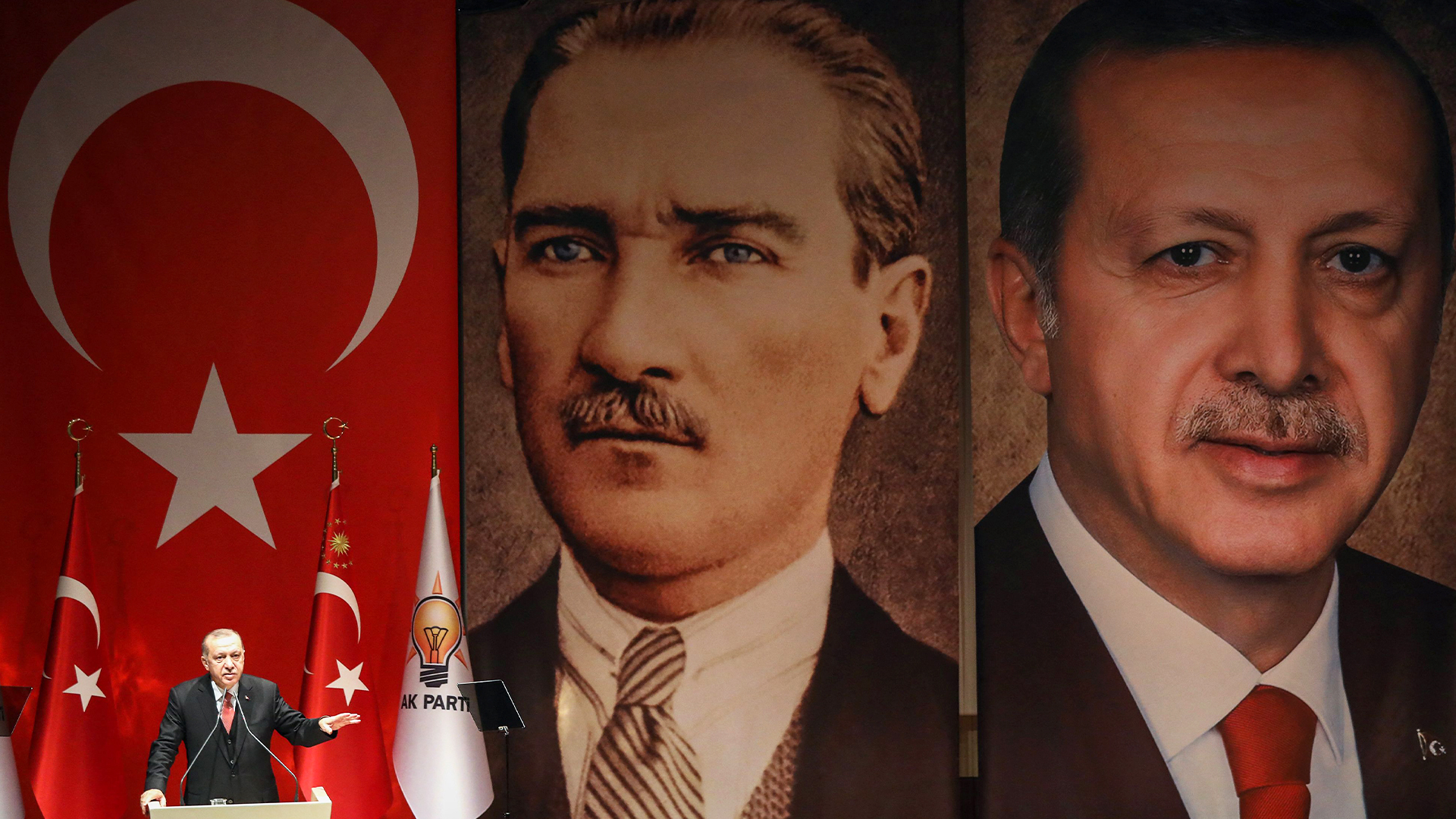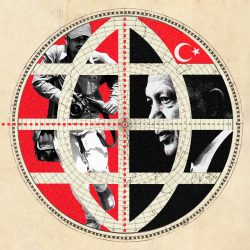
ADEM ALTAN/AFP via Getty Images
Echoing its battles in Florida, Disney circles a Turkish maelstrom
Turkey’s broadcasting regulation agency announced last week that it was opening an investigation into Disney after the beleaguered company decided to pull a TV series about the founder of modern Turkey, Mustafa Kemal Ataturk, from its streaming platform Disney+.
The series was set to air on the 100th anniversary of the founding of the Turkish Republic, October 29, when Ataturk became president. Instead, Disney said that the show will be released as two films: one to be shown on the Turkish free television network Fox, which Disney owns, and another to be released in theaters at a later date.
Turkish media and government officials blamed the Disney+ cancellation on Armenian lobby groups in the U.S., encouraging a popular backlash in Turkey against the company. Organizations such as the Armenian National Committee of America have expressed concerns that the series would gloss over Ataturk’s purported role in the mass killings of Armenians by Ottoman soldiers in 1915 — actions that are widely recognized as a genocide, including by U.S. President Joe Biden.
The clash between the guardians of Ataturk’s historical memory and Disney — which was founded 13 days before Ataturk became president in 1923 — underscores a complex challenge for U.S. entertainment giants. They have to figure out how to produce content for global markets while some governments look to enforce their own views of history.
In Turkey, Ataturk stands as a singular figure uniting Turkey. His image adorns walls everywhere, from barbershops to offices to fancy hotels. Prominent Turkish artists, journalists and politicians announced they would cancel their Disney+ subscriptions. Singer-songwriter Mustafa Sandal wrote to his one million Twitter followers: “I canceled it. Now it’s your turn! No Atatürk, no us!”
“I suspect that any film, even the most hagiographic film of Ataturk, would end up being dredged over the coals by the Turkish media simply because it could never be hagiographic enough,” said Howard Eissenstat, a non-resident scholar at the Middle East Institute and an associate professor of history at St. Lawrence University.
When the journalist Can Dundar made a documentary in 2008 depicting Ataturk as a heavy drinker with a fear of the dark, two university professors filed a formal complaint with an Istanbul court requesting an investigation into Dundar for “eroding Ataturk’s respectability.” Publicly insulting Ataturk in Turkey is a crime. Turkey’s top mobile telephone operator, Turkcell, canceled its sponsorship of the film.
Ebubekir Sahin, the chairman of the Radio and Television Supreme Council, a state agency in charge of regulating broadcasting that opened an investigation into Disney, wrote on Twitter that Ataturk is Turkey’s “most important social value.”
Ataturk is widely revered in Turkey, but not always for the same reasons. President Recep Tayyip Erdogan, who has sought to make Turkey a more religious and conservative society, has been selective about Ataturk’s legacy, downplaying his militant secularization of the country while praising his consolidation of the state and his fight against Western colonization in the Islamic world, according to Eissenstat.
There is a long history of U.S. media productions about Turkish history erupting into explosive debates, attacked by the Armenian diaspora or by Turks, according to Nicholas Danforth, a senior non-resident fellow at the Hellenic Foundation for European and Foreign Policy.
In the 1930s, a film about the Armenian genocide was canceled after Turkey applied pressure on the U.S. State Department and MGM Studios, the maker of the movie. In 2002, the director of “Ararat,” a film about the Armenian genocide, was targeted with threats that Armenians in Turkey would be harmed as a reprisal for making his film.
The battle over cinematic portrayals of Turkey’s role in the Armenian genocide played out most prominently in 2016, when a film called “The Promise” was shown at the Toronto International Film Festival. The film was only shown to a handful of attendees, but it received tens of thousands of one star ratings on IMDb, the film rating platform, followed by tens of thousands of ten star ratings, as Turkish nationalists and pro-Armenian groups flocked to the site to control the narrative.
No serious academics are willing to give genocide denial the time of day anymore, says Danforth. But, he said, there is frustration among historians about attempts to place all the blame at Ataturk’s feet. “There’s plenty to criticize about Ataturk, but for very specific historical reasons, making him a stand in for all the crimes of Turkish nationalism is misleading as well,” Danforth said.
This is not the first time Disney has been caught between a state and a diaspora over accusations of whitewashing a genocide. Its remake of Mulan in 2020 was subjected to a boycott because it was filmed in the northwestern region of Xinjiang, where China is committing what the U.S. Department of State and parliaments in the U.K. and Canadia recognize as a genocide against the Uyghur people. In the credits, the movie gives special thanks to multiple Chinese government entities in the region, including to the public security bureau in the city of Turpan where several re-education camps have been identified.
Warner Bros’ blockbuster film “Barbie” caused a stir because, in one scene, Barbie is seen standing in front of a child-like drawing of a map of the world. Next to what is supposed to be China is a dashed line that the Vietnamese government says is a representation of the nine-dash line, a maritime boundary that China claims marks its ownership of the South China Sea. The film was banned in Vietnam as a result. Meanwhile, the same map also depicts England as bordering Asia.
The geopolitical rivalry between the U.S. and China has divided the executive ranks of Hollywood entertainment companies, upended marketing plans and rattled prop masters. In the 2019 trailer for “Top Gun: Maverick,” the Taiwanese and Japanese flags were removed from Tom Cruise’s iconic bomber jacket, even though they had appeared in the original 1980s film. Fans complained. The flags were reinstated. The movie was banned in China.
The Chinese government has been ramping up pressure on the American film industry since the late 1990s, according to Chris Fenton, a film executive and former president of DMG Entertainment, a global media company headquartered in Beijing. As China’s market leverage grows, the Chinese government has become more forceful in demanding compliance with its views.
The Pentagon has expressed alarm. In July 2023, it announced that it will not share bases, ships and equipment with productions that allow the Chinese state to censor content in a way that advances China’s national interests.
Yet despite a desire behind closed doors to push back, Fenton said there is no coordinated effort within the film industry to counter China’s efforts to control content.
Conservatives in the U.S., frustrated by the Barbie movie map, which they see as legitimizing China’s position in the South China Sea, have attacked the film for undermining their values. Political commentator Ben Sharpiro began a scathing 40-minute review of the film by setting fire to Barbie dolls. In late June 2023, Florida Governor Ron DeSantis dominated the U.S. national news cycle when he accused Disney of putting “sexualized content” in its programming for children.
“The notion that Disney is in any way sexualizing children is preposterous and inaccurate,” Disney’s CEO Bob Iger responded, adding, “The last thing that I want for the company is for the company to be drawn into any culture wars.”
Disney+ was launched in Turkey last year as part of a global expansion into 42 new countries. Losing access to Turkey, with its population of over 85 million people, would be a blow to those plans. Disney+ has an estimated 50,000 subscribers in Turkey, compared to Netflix’s estimated 2.6 million, according to FlixPatrol.
Turkey is moving away from the West, disentangling itself from decades of alliance structures and huge defense contracts, according to Selim Koru, a fellow in the Eurasia Program at the Foreign Policy Research Institute.
“This is an American entertainment company pretending like these things are more or less as they were maybe 20 years ago,” he told me. “That a founding father of this deeply divided country is sort of an easy or manageable subject for a historical drama produced by a foreign company.”
The story you just read is a small piece of a complex and an ever-changing storyline that Coda covers relentlessly and with singular focus. But we can’t do it without your help. Show your support for journalism that stays on the story by becoming a member today. Coda Story is a 501(c)3 U.S. non-profit. Your contribution to Coda Story is tax deductible.
















